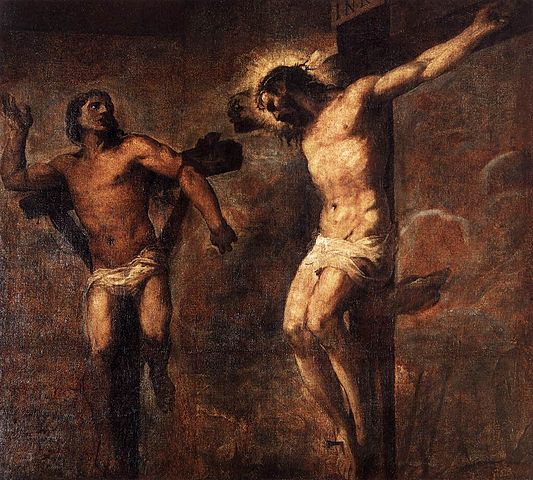
Christ and the Good Thief (c. 1566), by Titian (1490-1576) [public domain / Wikimedia Commons]
***
(1996)
***
Many evangelical Protestants like to point out that the thief on the cross next to Jesus wasn’t baptized and went to heaven anyway (Lk 23:39-43). From this they then conclude that both baptism, and sacraments in general are unnecessary for salvation.
This is a weak, insubstantial argument from the get-go, because it presupposes a fallacy of wrongly applying the elements of an extraordinary, exceptional situation to ordinary situations (i.e., the routine infant baptism). That’s as illegitimate as arguing from the “hard cases” of abortion to unlimited abortion-on-demand. C. S. Lewis said: “the rules of chess are what create chess problems.” One doesn’t ditch the rules upon discovering a potential or perceived “problem” made possible by the very existence of the rules!
The Catholic Church has always recognized the baptism of desire:
Those who through no fault of their own, do not know the Gospel of Christ or His Church, but who nevertheless seek God with a sincere heart, and, moved by grace, try in their actions to do His will as they know it through the dictates of their conscience – those too may achieve eternal salvation. (Vatican II: Constitution on the Church, I, 16; cf. Catechism of the Catholic Church, #1257-1261)
In other words, the thief was in this situation. He had the desire for salvation (and, one might say, for baptism), but obviously was in no shape to receive it! But generalizing from this case to everyone is clearly illogical. Furthermore, Paradise in this verse (Lk 23:43) about the thief on the cross (if interpreted literally) is not even referring to heaven, and indeed could not, since Jesus was not yet in heaven on that day (“today . . .”). He was crucified on Friday and didn’t rise from the dead until Sunday. In fact, He didn’t ascend to heaven until forty days after that (Acts 1:3, 9-11; cf. Jn 20:17).
Between Good Friday and Easter Sunday, He descended into Sheol, or Hades, the place of the dead (both righteous and unrighteous — see Luke 16:19-31) to preach to the captives (righteous dead). We know this from passages such as 1 Pet 3:19-20, 4:6, and Eph 4:8-10 (cf. Rom 10:7, Acts 2:27). So, then, Paradise in Luke 23:43 is referring to Sheol, not heaven. The conclusion is inescapable from cross-scriptural exegesis.
For example, Kittel’s Theological Dictionary of the New Testament (an impeccable and standard Protestant linguistic source) holds to this view, which is not just Catholic belief, but that of conservative Protestants as well (see also the reputable Protestant reference New Bible Dictionary, ed. J. D. Douglas, Grand Rapids, Michigan: Eerdmans, 1962 edition, 935).
When some Protestants claim that baptism isn’t necessary at all, they are in clear violation of scriptural injunctions or examples (e.g., Mt 28:19; Col 2:11-12; Jn 4:1-2; Eph 4:5; Acts 10:48; Gal 3:27). All Christians (excepting Quakers and the Salvation Army) have held to the necessity of baptism (if not regenerative baptism). There is no option for the believer on this point, provided he is able to be baptized (which the thief was not).
Furthermore, baptism is explicitly tied in with salvation in several passages (Acts 2:38; 1 Pet 3:21 [cf. Mk 16:16; Rom 6:3-4], Jn 3:5; Acts 22:16; 1 Cor 6:11; Titus 3:5). These constitute proofs for baptismal regeneration, which is held not only by Catholics, but also by Eastern Orthodox, Lutherans, Methodists, Anglicans, Churches of Christ, and Disciples of Christ. It is certainly as necessary for a Christian to be baptized, as it is to “receive Jesus into your heart” (which cannot be found in the Bible in those terms), whether or not it is considered regenerative.













